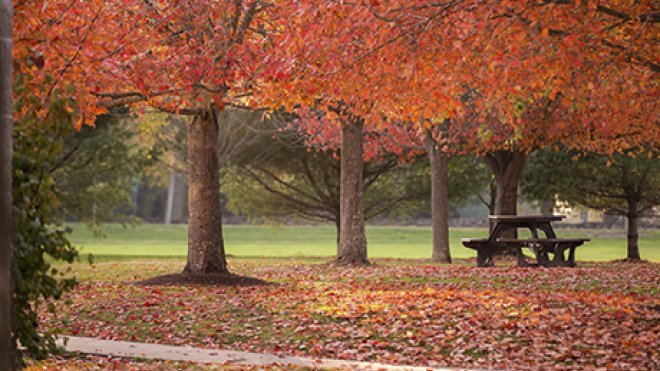RWU Arboretum a Reality as Campus Earns Accreditation
Home to more than 30 species of native and specimen trees, the RWU campus becomes an internationally accredited arboretum

BRISTOL, R.I. – With a pledge to steward the significant collection of trees on campus and to contribute urban forestry expertise on planting efforts with community partners across Rhode Island, Roger Williams University has become an internationally accredited arboretum.
The University earned the arboretum credential from the Morton Arboretum’s ArbNet Arboretum Accreditation Program – which establishes standards and guidelines for arboreta around the world – in recognition of the collection of trees on the Bristol campus, which is home to more than 30 species of native and specimen trees.
The Roger Williams University Arboretum claims the distinction of being one of only two college campuses in RhodeIsland – and joining a select group of 14 other colleges and universities in New England – to earn ArbNet accreditation.
“Being designated an arboretum will inspire us – students, faculty and staff – to collectively manage and conserve the great natural resource that is our beautiful bayside campus,” says Stephen White, co-chairman of the RWU Arboretum Steering Committee and dean of the School of Architecture, Art and Historic Preservation. “We’re embracing the idea that this is our backyard, and we should be an example of environmental leadership here and also put that knowledge to work in the community.”
The goal of the arboretum project, White says, is to promote a culture that embraces urban forest renewal and to preserve distinctive arboretum elements for the enjoyment of the campus and greater community. Just as integral to the arboretum’s mission will be ongoing programs and projects that engage students, faculty members and community partners in environmental service on campus and within the wider community. An arboretum dedication ceremony will take place at 2 p.m. on Saturday, Oct. 24, during Homecoming & Family Weekend.
Under the guidance of faculty and staff, students will take the lead in cultivating the campus arboretum through volunteer service opportunities, coursework and professional tree stewardship training with the Rhode Island Tree Council’s John Campanini. More than 200 architecture and education students will be introduced to the arboretum effort this year through RWU’s Center for Macro Projects and Diplomacy and the Feinstein Center for Service Learning and Community Engagement, comprising an initial volunteer corps that has the potential for university-wide participation.
The group’s efforts will kick off with identifying and digitally mapping each tree specimen for taxonomic labeling, starting from a comprehensive guide of 30 campus trees species developed more than a decade ago by Martine Villalard-Bohnsack, a former RWU biology professor who retired in 2005. They will also assist the RWU facilities staff with tree maintenance and plantings throughout the year.
The initiative began in 2014 in an independent study course undertaken by architecture major Loren White ’14, with collaboration from Christian Johnson ’15 – now a first-year architecture graduate student – and guidance from White as well as Peter Wilbur, vice president for university outreach and engagement; Matt Clement, supervisor of grounds and athletic fields; and Gregory Laramie, associate dean of SAAHP. Their work was furthered by a steering committee that includes University Trustee Arlene Violet, Vice President for Institutional Advancement Lisa Raiola and Director of Facilities John Tameo, along with White and Wilbur.
While the RWU Arboretum project is an on-campus initiative, some of the work will be integrated with projects already under way with community partners around the state. This fall, a new partnership launched among the School of Architecture, Art and Historic Preservation, the School of Education and the Newport Tree Society to collaborate on several projects in the coming years, including the development of a citywide arboretum in Newport as well as a children’s arboretum at Claiborne Pell Elementary School, a curriculum on forest ecology for Pell elementary students and work on general tree planting and maintenance efforts around the city. The effort also builds on service projects that have deployed hundreds of student volunteers to nine other cities and towns in Rhode Island to perform tree plantings this past year.
Through the RWU Arboretum and community projects, White hopes to foster an understanding of the positive ecological and economical impact of urban forests and to use that as a catalyst to inspire actions combating climate change, such as urban reforestation projects. Students will be able to measure and analyze the ecological and economic impact of the campus arboretum via new technology available to the general public from the U.S. Forest Service.
“Throughout the national and global climate change debate, many people ask: ‘How can we make a positive impact?’” White says. “That’s exactly what a university can do. We work together to acquire knowledge and, more than in the past, we can recognize how to mobilize our university community to achieve significant results for society and the environment.
“We will be learning here on campus how to create an environmental balance between the ecosystem and built environment, advancing the University’s sustainability goals. And then we’ll put our knowledge to work for the state. Through further collaborations with community partners, we’ll be able to work in the region and farther afield.”